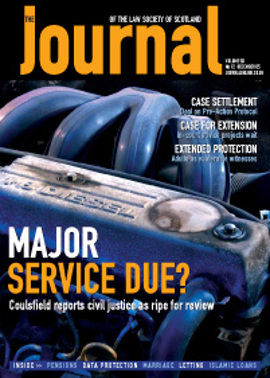Vital voices revisited

The Vulnerable Witnesses (Scotland) Act 2004 received Royal Assent on 14 April 2004. It was the result of extensive consultation and responded to the concerns held by many organisations and individuals that too many victims of and witnesses to crime found the criminal justice process daunting, stressful and intimidating.
It was generally accepted that changes to the law were required on the categories of persons who should be able to use special measures when giving evidence, the types of special measures used and the availability of these measures in different court proceedings.
The Act in outline
It is worth recalling what the Act is intended to do. A summary of the main provisions can be found in the March Journal article at page 14 (online at www.journalonline.co.uk/article/1001576.aspx).
Key provisions include:
In criminal cases:
- All child witnesses under the age of 16 will be automatically entitled to standard special measures to assist them to give their best evidence (more on this below).
- Applications may be made to request any special measures for any child or adult vulnerable witnesses, including witnesses for the defence.
In civil cases:
- Standard and further special measures also apply in civil proceedings including children’s hearings court procedures.
- There is provision to protect children and young people against unfair use of sexual or character history evidence about them in children’s hearings court procedures.
In both criminal and civil cases:
- The definition of “vulnerable witness” is widened to include anyone where there is a risk that the quality of their evidence may be diminished by reason of fear or distress in connection with giving evidence at the trial. This will enable the court to take into account the wider circumstances of the case, such as the nature of the evidence the witness will give and any relationship between the witness and the accused.
- The Act abolishes the “competence test”. The court is no longer entitled to ask preliminary questions of the witness to ascertain whether the witness understands the difference between truth and lies and the duty to give truthful evidence.
The Act formalises existing special measures and introduces some new ones.
The standard special measures, which child witnesses under the age of 16 have a right to use are:
- a live television link in another part of the court building (or from another place if the child is under 12);
- a screen; and
- a supporter, in conjunction with either of the above measures.
The full list of special measures available on application, which can be used by either a child or adult vulnerable witness is:
- a live television link from another part of the court building or other place outwith that building;
- prior statements as evidence in chief (in criminal cases only);
- taking of evidence by a commissioner;
- a screen; and
- a supporter.
Most of these measures also apply if a child accused or adult accused who has also been identified as a vulnerable witness gives evidence.
The special measures may be used in combination where appropriate.
Four-stage commencement
The implementation of the Vulnerable Witnesses (Scotland) Act is being staged over four phases.
The first phase was the implementation of provisions applying to children in High Court and sheriff court solemn cases, which came into effect on 1 April 2005. From the same date the Act and its provisions also applied to children’s hearing court proceedings in respect of relevant appeals and applications under sections 51(1), 68 and 85 of the Children (Scotland) Act.
From 1 April 2006, phase 2 will commence provisions in respect of adult vulnerable witnesses in High Court, sheriff court solemn cases and children’s hearings court proceedings.
The third phase, during 2007, will see the extension of the Act’s provisions to cover sheriff court summary cases, although timing will be dependent on implementation of the recommendations of the McInnes report on summary justice.
The final phase of implementation will extend the Act’s provisions to civil cases, both in the Court of Session and in the sheriff court (including fatal accident inquiries).
Identifying vulnerable adults
It is generally agreed that a key challenge of phase 2 will be the identification of vulnerable adult witnesses. That is why the Scottish Executive’s Victims and Witnesses Unit, in collaboration with key partner organisations, is currently preparing guidance to help those parties citing witnesses identify adult vulnerable witnesses and consider their requirements for special measures.
The guidance will clarify the key definitions of vulnerability in the Act and provide an explanation of the factors to be taken into account by the court when determining if a witness is vulnerable in terms of whether to grant the use of any special measures. The guidance will draw on common sense and will support existing good practice.
The guidance advises:
“Under the Vulnerable Witnesses (Scotland) Act 2004, a special measure for an adult witness can only be considered: ‘where there is a significant risk that the quality of the evidence to be given by the person will be diminished by reason of –
(i) mental disorder within the meaning of section 328 of the Mental Health (Care and Treatment) (Scotland) Act 2003, or
(ii) fear and distress in connection with giving evidence at the trial or proceedings’.”
The guidance also clarifies:
- The reference to the quality of evidence is to its quality in terms of its completeness, coherence and accuracy.
- The use of the word “significant” in the Act indicates that an adult may only be considered as a vulnerable witness if there is an important or material risk that the completeness, coherence and accuracy of his or her evidence will be reduced. It is only once the court is satisfied in this regard that a special measure will be granted.
- Adult witnesses, regardless of who is citing them, are not automatically defined as vulnerable and as such have no entitlement to special measures.
- The party citing the witness must make an application to the court.
- It is for the court to decide whether any adult witness is a vulnerable witness and whether to grant the use of any special measure.
- Arrangements for giving evidence can be reviewed by the party citing the witness or by the court itself, at any time in the course of the court proceedings.
- Before granting the use of special measures for a vulnerable witness, the court must first be satisfied that the adult witness is a vulnerable witness and in determining this, the court must consider:
– the possible effect on the witness if they have to give evidence without using a special measure, and
– whether it is likely that they would be better able to give evidence using a special measure.
The court will also take into account a number of factors about the circumstances of the case and the personal and social circumstances of the witness. These factors are set out in the legislation and include:
1. Adult witnesses with mental health problems, learning disabilities or emotional or behavioural problems amounting to a personality disorder (see section 328 of the Mental Health (Care and Treatment) (Scotland) Act 2003, www.opsi.gov.uk/legislation/scotland/acts2003/30013-an.htm#328;
2. The nature and circumstances of the alleged offence;
3. The nature of the evidence to be given (if likely to be particularly distressing);
4. The relationship between the accused and the witness;
5. The witness’s age and maturity;
6. Any behaviour towards the witness from the accused, their family or associates, or from any other witness or accused person;
7. The witness’s religious beliefs, sexual orientation, ethnic, social and cultural background or political opinions;
8. The witness’s domestic and employment circumstances;
9. Any physical disability or impairment of the witness which could affect the giving of evidence; and
10. Any other relevant factor.
Some or all of the above factors may indicate to the court that there is a significant risk that the quality (namely the completeness, coherence and accuracy) of a particular witness’s evidence may be affected and that the use of special measures may be appropriate. Some factors will have greater significance in certain types of cases than in others.
These factors are not in themselves absolute indicators of vulnerability. A factor that may present a significant risk to the evidence of one person may have little or no effect on the evidence of another. In every case there must be a significant risk that the quality of the witness’s evidence will be diminished as the result of one or more of these factors.
The guidance goes on to outline a number of indicators of vulnerability at all levels, which practitioners should be familiar with and take into account. The test for all practitioners is whether a witness’s vulnerability can be alleviated by support and assistance other than special measures or whether steps should be taken to secure the use of special measures, as provided for in the legislation.
In February and March 2006, the Scottish Executive, alongside key partner organisations, will be running a series of roadshows throughout the country to raise awareness of the forthcoming implementation of phase 2 in relation to adult vulnerable witnesses. Practitioners interested in attending any of the roadshows can find details on the Update page in this issue (page 8).
Further information
The Scottish Executive Victims and Witnesses Unit website www.scotland.gov.uk/Topics/Justice/criminal/17416/8451 provides a wide range of information about the progress of the vulnerable witnesses implementation, including practitioner guidance on the Act, the provision of special measures and booklets for child witnesses. The website also provides details on the wider aspects of what the Unit is doing to help meet the goal of putting victims and witnesses at the heart of the criminal justice system.
In this issue
- Holes in Scotland's corporate killing proposals
- A month of contrasts
- Too small to be flexible?
- Engine overhaul
- Vital voices revisited
- Letting in the law
- Puzzles and paradoxes
- Legacy giving in a Scottish climate
- New deal for PI claims
- Data protection crackdown: do you comply?
- In real terms
- Access route
- Better law-making: just lip service?
- Appealing prospects
- The limits of diversification
- Cashing in on the event
- Farewell then common law marriage
- Scottish Solicitors Discipline Tribunal
- Website reviews
- Book reviews
- Unveiling the Islamic mortgage






